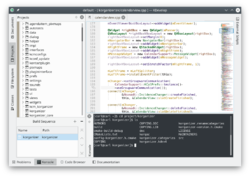KDevelop/de: Difference between revisions
Appearance
No edit summary |
Updating to match new version of source page |
||
| (10 intermediate revisions by 3 users not shown) | |||
| Line 4: | Line 4: | ||
|} | |} | ||
== | <span id="History_(inspired_by_Wikipedia)"></span> | ||
== Geschichte (von Wikipedia inspiriert) | |||
The KDevelop project started in 1998 at the University of Potsdam (Germany). The first released 0.1 was released the same year<ref>[https://marc.info/?l=kde-announce&m=90648146015087&w=2 KDevelop 0.1 announcement]</ref>. | The KDevelop project started in 1998 at the University of Potsdam (Germany). The first released 0.1 was released the same year<ref>[https://marc.info/?l=kde-announce&m=90648146015087&w=2 KDevelop 0.1 announcement]</ref>. | ||
KDevelop has experienced several rewrites. The first time was with version 3.x by Bernd Gehrmann in 2001<ref>[https://marc.info/?l=kde-core-devel&m=98598814600661&w=2 A new IDE for a new millennium :-) by Bernd Gehrmann]</ref> and the second time was with version 4.x with a more object-oriented architecture in 2009<ref>[https://apaku.wordpress.com/2009/11/29/kdevelop4-moved/ KDevelop4 moved]</ref>. | KDevelop has experienced several rewrites. The first time was with version 3.x by Bernd Gehrmann in 2001<ref><!--(-->[https://marc.info/?l=kde-core-devel&m=98598814600661&w=2 A new IDE for a new millennium :-) by Bernd Gehrmann]</ref> and the second time was with version 4.x with a more object-oriented architecture in 2009<ref>[https://apaku.wordpress.com/2009/11/29/kdevelop4-moved/ KDevelop4 moved]</ref>. | ||
The development of KDevelop 5 started in August 2014 as a port of the KDevelop 4 codebase for | The development of KDevelop 5 started in August 2014 as a port of the KDevelop 4 codebase for Qt5 and KF5<ref>[https://www.kdevelop.org/frameworks/kdevelop-master-now-depends-kde-frameworks-5 KDevelop master now depends on KDE Frameworks 5!]</ref>. The custom C++ parser was abandoned in favor of clang, and the CMake interpreter was also replaced in favor of using the JSON metadata given by CMake. KDevelop 5 was released in August 2016<ref>[https://www.kdevelop.org/news/kdevelop-500-released KDevelop 5.0.0 release]</ref>. | ||
== Features == | == Features<ref>[https://www.kdevelop.org/features KDevelop feature]</ref> == | ||
* | <div class="mw-translate-fuzzy"> | ||
* Unterstützt Ada, Bash, C, C#, C++, D, Fortran, Haskell, Java, Objective-C, Pascal, Perl, PHP, Python, Ruby, SQL, und XUL | |||
</div> | |||
* Support multiple version control systems Git, Bazaar, Subversion, CVS, Mercurial (hg), Perforce | |||
* Support | * Support multiple build system CMake, QMake, Makefile, Meson<ref>[https://bugs.kde.org/show_bug.cgi?id=343935 Meson support bug report]</ref>, ... | ||
* Quick Code Navigation (Jump to declaration/definition) | |||
* Code comprehension (Syntax highlighting, semantic code completion) | |||
* Documentation integration | |||
* Integration support for multiple static analyzers: [http://clang.llvm.org/extra/clang-tidy/ Clang-tidy], [https://www.kdab.com/use-static-analysis-improve-performance/ Clazy] and the [http://cppcheck.sourceforge.net/ Cppcheck] | |||
<span id="Tips"></span> | |||
==Tipps== | ==Tipps== | ||
* [http://apaku.wordpress.com/2008/12/15/howto-create-build-and-run-a-simple-kdevelop4-project How to create and build a simple KDevelop4 project] | * [http://apaku.wordpress.com/2008/12/15/howto-create-build-and-run-a-simple-kdevelop4-project How to create and build a simple KDevelop4 project] (engl.) | ||
== | <span id="More_Information"></span> | ||
== Mehr Informationen == | |||
* [https://www.kdevelop.org/ KDevelop website] | * [https://www.kdevelop.org/ KDevelop website] | ||
* [https://en.wikipedia.org/wiki/KDevelop Wikipedia] | * [https://en.wikipedia.org/wiki/KDevelop Wikipedia] | ||
* [[Special:MyLanguage/KDevelop5/Manual|KDevelop 5 Handbuch für den Schnelleinstieg]] | |||
* [[Special:MyLanguage/KDevelop5/Manual|KDevelop 5 | |||
==References== | ==References== | ||
[[Category:Entwicklung/de]] | [[Category:Entwicklung/de]] | ||
Latest revision as of 05:05, 19 May 2024
 |
Eine integrierte Entwicklungsumgebung (IDE) für MS Windows, Mac OS X und Linux |
== Geschichte (von Wikipedia inspiriert)
The KDevelop project started in 1998 at the University of Potsdam (Germany). The first released 0.1 was released the same year[1].
KDevelop has experienced several rewrites. The first time was with version 3.x by Bernd Gehrmann in 2001[2] and the second time was with version 4.x with a more object-oriented architecture in 2009[3].
The development of KDevelop 5 started in August 2014 as a port of the KDevelop 4 codebase for Qt5 and KF5[4]. The custom C++ parser was abandoned in favor of clang, and the CMake interpreter was also replaced in favor of using the JSON metadata given by CMake. KDevelop 5 was released in August 2016[5].
Features[6]
- Unterstützt Ada, Bash, C, C#, C++, D, Fortran, Haskell, Java, Objective-C, Pascal, Perl, PHP, Python, Ruby, SQL, und XUL
- Support multiple version control systems Git, Bazaar, Subversion, CVS, Mercurial (hg), Perforce
- Support multiple build system CMake, QMake, Makefile, Meson[7], ...
- Quick Code Navigation (Jump to declaration/definition)
- Code comprehension (Syntax highlighting, semantic code completion)
- Documentation integration
- Integration support for multiple static analyzers: Clang-tidy, Clazy and the Cppcheck
Tipps
